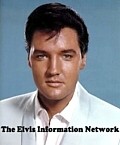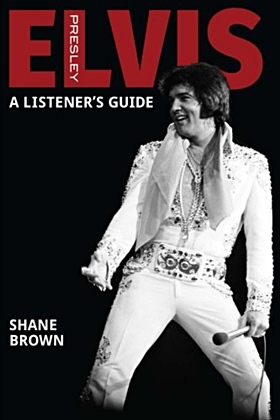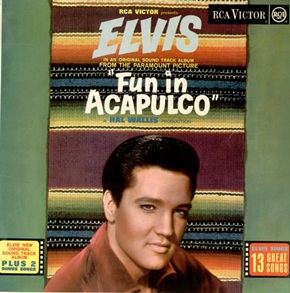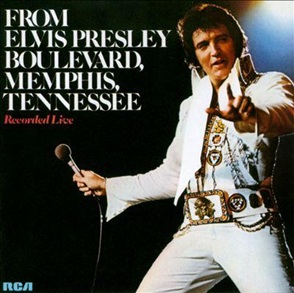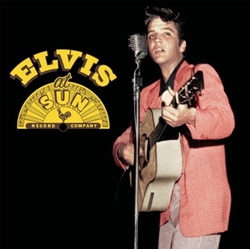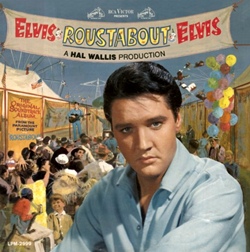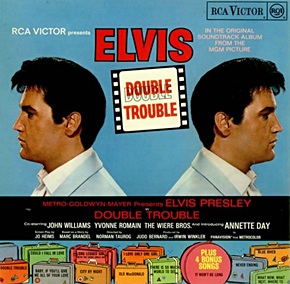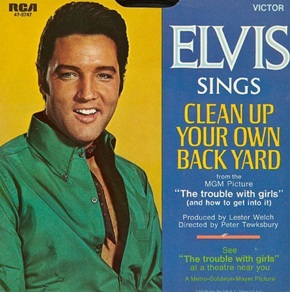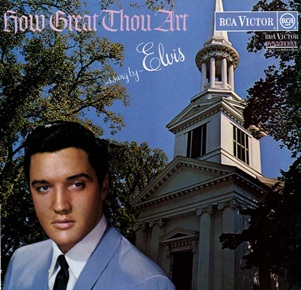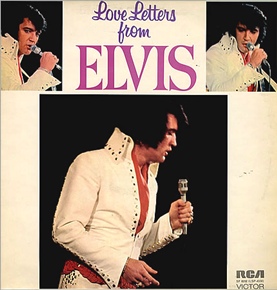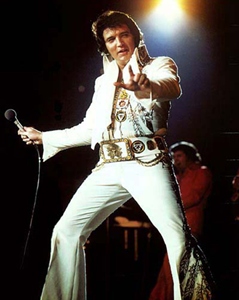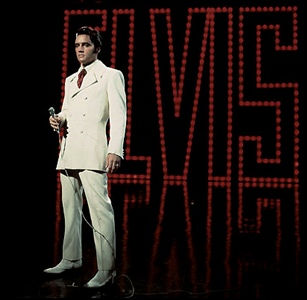 |
 |

Shane Brown: I started back in February, I think. So it took five months roughly. I’d literally just finished my PhD and so had time on my hands. I generally work quite quickly – I’m not one who sits and plans before writing, I just sit down and type for the most part. And, apart from minor changes, the final version looks pretty much like the first one. It’s just the way I like to work. The most time consuming thing was working through newspaper and magazine archives when I made the decision to incorporate contemporary reviews into the book. EIN: Was your book written with the keen Elvis Presley collectors in mind, or with the General Public who would know little about Elvis’ music outside of the greatest hits? SB: I tried to cover all bases – but you don’t always please everyone all the time when you do that! I like reading reviews, and I like comparing what I think to what others think, and that was at the heart of the book from the beginning. What kind of Elvis book would I want to buy? And, really and truly, there isn’t a full-length song-by-song critique of Elvis’s music out there at the moment. That side of the book probably appeals to everyone except the hard core collector who has everything, and are probably more interested in new information or photos etc. That’s how the discussion of reviews and articles from the 1950s to the 1970s got included. By discussing how Elvis’s music and films were received at the time in publications such as the New York Times, The Times, and Variety (the archives of which are not free to all), I thought I could offer something for the keen collector as well. And I hope people think I dredged up some interesting stuff. EIN: I believe your main interest is in film and that you have previously published books. Can you tell us a little about your background and how you came to publish a book dedicated to Elvis’ music? SB: The only full-length book so far is a young adult novel I published last year. But, my PhD was in film, but was also about social history and touches on literature and other things, so I’m used to crossing boundaries. But yes, all my previous published work (articles and essays in journals and books that are collections of essays) is related to film and television, particularly on how certain stars were treated by newspapers or magazines – so you can see how that fed into the book. When I was a rather green and naïve twenty year old back in 1994, I actually started a book on Elvis. I sent it off to a small publisher who encouraged me to finish it to their specifications as they knew a place looking for a book just like mine. They wanted it to be one of those little CD case sized books. I did what I was asked but John Robertson’s book was chosen instead. I was devastated at the time – but very happy now as what I wrote back then really was a pile of crap. An AWFUL book! However, I’ve always had it in the back of my mind to write it properly (and to my own specs) and that’s what I’ve done as a far less-naïve forty year old! I needed a push to do it but, once I wrote the pages on the private recordings from 1953 and 1954, I realised it was going to come out OK.
EIN: Elvis cleverly covered all bases, film, TV, fashion, music, rock’n’roll, schmaltzy ballads, leather rebellion, family-friendly movies etc. Do you think his music is the all-important part or do you look at his career as a whole? SB: It’s called a listener’s guide, but I talk about the films to a certain degree when I discuss the soundtracks. I don’t think you can understand one without the other. It also helps us to understand why Elvis’s career took the turns it did in the 1960s. The New York Times hated Elvis in 1956, but loved Fun in Acapulco, for example, and so there is a need for at least a small amount of discussion away from the music. At the same time as giving comments on the music, I also wanted to tell the story of his career. Sometimes the discussion of the music does that by itself, but there are other times when at least some background is needed. The films are one example. And the post-1973 years needed expanding upon too, as the sessions are so few and far between that they can’t tell the story on their own. So, again, I try to fill in the gaps through referencing newspaper and magazine articles from the period. EIN: Some key songs in Elvis’ legacy could have whole chapters written about them. How did you manage to balance thousands of words you could write about ‘Mystery Train’ for instance compared to the silly movie soundtrack songs of the mid-60s? SB: One thing I (accidentally) learned at university is that it’s more difficult to write about something you love than something you hate – so word count didn’t really come into it, although I knew that I had to keep within the limits I had set myself. The Wonder of You and Guitar Man get half a page each, but so does Poison Ivy League! It just depended on whether I had something new and/or interesting to say. Sometimes the classic songs were most difficult – what hasn’t been said about Heartbreak Hotel, for example? Do I add anything significant to that discussion? No, not really – but then I do talk about how Elvis excising the third verse from The Wonder of You might have contributed to its success, which I don’t think has been discussed before. It’s all swings and roundabouts.
EIN: How did you manage to keep the book down to three hundred pages, did you have an editor to help? SB: No, just me! The Elvis book is 328 pages in length, and my novel was 278 pages – and yet the word count for the Elvis book is nearly double that of the novel! It can be deceiving due to the different layouts involved. I expected to write about 80,000 words, and it ended up at 120,000. But that’s the beauty of self-publishing – it doesn’t matter! EIN: How much photographic material is there in the book? SB: None is the straight-forward answer! I thought it would be the main criticism, but no-one’s mentioned it. There are so many wonderful photo books out there now that me including a handful of pictures seems almost pointless and would probably have raised the price of the book. For those who want Elvis photos, those books are out there and they do it far better than I ever could. At one stage I was hoping to include pictures of album covers etc at the relevant points, but I never got a reply when trying to get permission for that. I think in the business that’s known as "doing a Chuck Berry!" In the end it didn’t matter, but it would have been nice to have that option. EIN: Looking back at some of Elvis’ recordings from over 40 years later, it is hard to understand how they would have been thought of, or reviewed at the time. Did you compare your opinions in 2014 against what the contemporary reviews were from the period? For instance I can never understand how the ‘Roustabout’ album made number 1 in the US. Can you explain? SB: The Roustabout album is explainable if you look further afield. Viva Las Vegas came out and was a hit and had no soundtrack album. The next album to come out in America was Roustabout and it hit the top spot. But in the UK the first album after Viva Las Vegas was Kissin’ Cousins, and it was THAT album which did well, with Roustabout not as successful. I think people simply bought the first new Elvis album to come out after Viva Las Vegas, no matter what it was. The book references, and quotes from, around 175 reviews and articles from the period. It wasn’t in my original idea for the book, but I had access to the archives and had published some work on reception in the past, and how certain stars were treated by certain newspapers etc, so it ended up being a natural thing to do. Sometimes the reviews were more positive than expected, and other times they were really very harsh. For example, The Times newspaper in the UK wrote of Double Trouble that "it has often seemed that Elvis Presley films are intended these days primarily for children. The main difference with the present example is that it seems to be intended for idiot children." On the other hand, the New York Times was very enthusiastic about The Trouble With Girls!
EIN: It is amazing that Elvis managed to produce such great music over three decades, in the 50s, in the 60s as well is the early 70’s. Do you have a particular favourite period? SB: I’ll be predictable, and say 1968-1970. But I also think that the non-soundtrack work from 1966-1968 is the most overlooked and unfairly neglected group of recordings in the Elvis legacy. There is some truly lovely material there (and some very nice things in the post-Speedway soundtracks, too.) EIN: Do you have a particular favourite genre of music and do you think this is reflected in your writing? SB: Oddly, the vast majority of my collection (Elvis aside) is jazz and classical music! Twenty-five years ago when I first started listening to Elvis, there wouldn’t have been any jazz on my shelves, but our tastes change and expand. I was working in a little used record shop just after I left school and someone asked me to play a track from a record we had which had Sinatra singing with Duke Ellington (Francis A & Ellington K). It opened up a musical world I hadn’t really been exposed to before, and I fell in love. But, just like a jazz singer, Elvis often worked on instinct and much of his music-making was "of the moment" – just listen to the last couple of minutes of Whole Lotta Shakin’ Goin’ On or Don’t Think Twice, he uses his voice just as a jazz singer would, changing the melody with each verse. Some of his best work was when he was just improvising. EIN: Is each song and session reviewed chronologically? Because RCA sometimes had a very bizarre approach to Elvis’ albums. For instance following ‘Aloha’ with the dreadful bottom-scraping compilation ‘Elvis: Fool’ album. What are your feelings about RCA’s original release schedule and are they presented in your book? SB: The book moves through the music session by session. Sometimes the songs are dealt with out of order within the session – for example, the How Great Thou Art sessions deals with the gospel material first and then the secular songs. There were some very strange decisions made in Elvis’s albums – and that includes the very first one. The UK edition had a much better track listing than the American one. Yes, my thoughts are included within the book. For example, I argue that Aloha should have been followed with Gold Records Vol 5. An album that pulled together the Memphis singles, If I Can Dream, I’ve Lost You, You Don’t Have To Say You Love Me and others would have created a useful punctuation point in Elvis’s career and portrayed him as a relevant performer of adult contemporary music. Fool has its nice moments, but is a very low-key affair. EIN: How does your writing and book compare to, for instance, Ernst Jorgensen's classic 'Life In Music', Ken Sharp's 'Writing For The King' or Tunzi's 'Sessions'? SB: It’s certainly not a sessions book – you won’t find info on who played bongos on a track here. Ernst’s book is masterful – he manages to combine a sessions book with a compelling narrative while offering a critique of the major sessions too. I also like Writing for the King very much – it’s absolutely unique and thoroughly entertaining. I reference both books within my own. My book is not concerned with who did what and when, but what the end result of those happenings were. Again, it’s a book largely of opinion, but I do go back on numerous occasions and look at the recording of a song that influenced Elvis and detail how he altered or manipulated the sound of it for his own purposes – how he made it his own. Through the wonders of the internet it’s easy to hunt down original recordings and hear them. We couldn’t have done that ten or fifteen years ago (and David Neale’s website is the most wonderful source of that information). That is always going to be of more interest to me as a writer than lists of personnel, and that kind of information is available elsewhere anyway. EIN: Last year’s "Elvis Music FAQ" book basically had the same premise as your new book, examining every Elvis songs. How do the two books compare? SB: Mike Eder’s FAQ book strays from the music much more than mine, giving more background info and chapters on other subjects. He also doesn’t go song by song through the music. For example, he sums up the two 1962 soundtracks in a couple of paragraphs, whereas I spend six pages on them. We had different aims. SB: I had more fun working on the soundtracks than on any other section. Not because the music is good, but mostly because it’s music I don’t visit very often, so it was fresher to me. Also, I had some fun with it, too. I’m so used to writing in an academic way these days (which is very dry) that it was great to be able to make light-hearted comments in various places. I took them as seriously as the rest of the sessions, but I wanted to make the book entertaining, so there are humorous asides here and there throughout the book, not just during the movie years. EIN: Elvis was the greatest entertainer in history - why was he so weak as to not say "NO" to purile crap like 'Old MacDonald's Farm' or 'Queenie Wahine'? SB: When I was researching the articles and reviews from the period, I found an interview in Variety with the Colonel. In it he states that Elvis has no say on scripts or production costs. It’s a horrible article to read (I discuss it on p.141 of the book) and shows just how the Colonel viewed Elvis as a commodity – and he’s very open about it. That said, Elvis had a tongue in his head, and was in a position where he could have stood up and said "no." He wouldn’t have been the first star to do so in Hollywood. I think, sadly, he was just of the personality where he was happy to go along with what other people wanted, and was afraid to upset the apple-cart. I find that hard to understand as I’m an outspoken old devil, but not everyone is like that sadly.
EIN: A large number of Elvis’ 1970’s recordings were buried under excessive orchestral overdubs by Felton Jarvis. These may have been the flavour of the era, but they now sound so outdated with the songs sounding far more interesting on the original FTD released studio tapes. Do you discuss this in your book and in your opinion was Felton Jarvis good or bad for Elvis? SB: I do talk about the overdubs in the book, although not with regards to every song, of course. The ones for the Love Letters LP are awful, truly appalling. By the time of the 1976 studio sessions, though, I think they were used to mask some of the problems with Elvis’s vocals. I talk quite a lot about how Elvis’s product was presented to the consumer, and so while Jarvis might not be mentioned by name all the time, his role is discussed. There is a lot of criticism, for example, about how certain songs were edited at the time. I think it robbed many performances of their full potential. It seemed to be the idea that Elvis fans couldn’t concentrate for longer than three minutes. EIN: Do you discuss Elvis' role as a producer? SB: I nearly always place him as the man in control during the session – which he was. He decided (mostly) on the songs and arrangements etc. He never really took advice on how to sing something, for example. And yet, despite that, once he walked out of the studios at the end of the session, he so often didn’t care what happened to his work afterwards – the overdubbing, editing, presentation to the public, album track listings etc. It’s a complete conundrum. EIN: In your opinion was Colonel Parker good or bad for Elvis’ music? After all Parker had very little to with Elvis’ actual recordings? SB: Well, publishing certainly had an effect on what Elvis recorded, it seems. It’s easy to demonise Parker, but he was also extremely smart at times. We can criticise now how he took Elvis in 1960 and made him a family entertainer, but at the time it wasn’t known that rock ‘n’ roll was "here to stay." It was a smart move at the time and expertly handled. On the other hand, the Variety interview mentioned earlier portrays him as a rather odious man whose sole interest was making money. Like everyone, he did good things and bad things, and Elvis didn’t have the right nature to put his foot down. EIN: Do you really review every song Elvis recorded? Elvis personally disliked a lot of his movie soundtrack material that he was forced to record. I am sure that there are plenty of songs that Elvis would like you to overlook! EIN: 'Do The Clam' charted #4 in Australia, going higher than Love Me Tender or Kentucky Rain - is there any hope for us?! EIN: After spending so much time listening to Elvis’ recorded material, what Elvis song still truly inspires you and what Elvis song do you never want to hear again? SB: When I was first getting into Elvis, the 1968 comeback was shown on UK TV at about 3am in a very strange format over two episodes! I had no idea whether it was all one show, or whether it was a compilation, or what it was. The screening was very confusing. Both episodes ended with If I Can Dream. I still find the song extremely moving, no doubt thanks to personal circumstances, but it doesn’t get better than that in my opinion. Of the hits, I would rather never hear Love Me Tender again. It’s not a bad recording of course, but it really does nothing for me. Aside from that, about a quarter of the 1971 Christmas album is just awful in my opinion. I never play it. SB: It was easier than I thought. The three live albums from 1972, 1973 and 1974 are actually rather different to each other in style and tone: the almost manic pace of MSG, the more subdued Aloha, and the rather joyful Memphis concert (at least in its original LP form). I take those kind of issues on board as well EIN: Do you also look at FTD fan club releases of unreleased RCA material? SB: Not a great deal within the main section of the book. If I started talking about alternate takes, I’d be writing a book 3000 pages long rather than 300! There is a "Coda" to the book where I talk about how Elvis’s legacy has been handled since his death, and FTD gets discussed there. My comments in that section have not gone down particularly well, mostly because I argue that certain concerts should never have seen the light of day due to Elvis’s poor performance. I’m not someone who thinks we automatically have the right to hear something just because it exists. If it shows Elvis in a bad light, why release it? Why own it? I don’t want to hear Elvis on stage barely able to talk, let alone sing. I don’t get it.
EIN: There is a lot of sadness amongst Elvis’ 1970s material. I am always surprised how many fans love all of the original releases from the Jungle Room sessions. Do you present some challenging thoughts in your book about these later sessions? SB: I think the October sessions are better than the February ones, that’s for sure. Elvis sounds so old in the February recordings, and yet it was only eleven months after the rather fun Today sessions. I try not to just say "these are bad," but instead try to give perspective. For example, I compare the rather heavy-handed For the Heart with the recording the year before by Teresa Brewer (also produced by Jarvis). But even in these sessions there is the wondrous Danny Boy, a recording that shows you don’t have to be in great voice to record something very special, but you do have to be in the right frame of mind. EIN- Do you think fans will fans be surprised by some of your opinions in your reviews? SB: Some fans know me from forums, and will already know my thoughts on some sessions so, in those cases, probably not – although I make a case for He’s Your Uncle Not Your Dad, so who knows! Others will come to it fresh, and hopefully will find some interesting viewpoints. My comments on Frankie and Johnny, for example, are far more positive than most. But I haven’t argued black is white just for the sake of it. EIN: How has the feedback from readers been so far? SB: It’s been entertaining! Anyone would think I’d written the most controversial book in history! The Amazon reviews thus far are, it’s safe to say, mixed. But I think there is a reason for this. My book is advertised as a "fresh look" at the music. And it is. I don’t approach it with any preconceptions. Most writers in the past have favoured the rock ‘n’ roll music over any other, and I don’t do that. Genre is immaterial to me – I’m only interested in how successful it is. You said earlier that my background is in film, and in film studies we don’t have a hierarchy of genres. To us, a discussion of a daytime soap is as relevant as a discussion of Citizen Kane. I wanted to bring that mentality to Elvis’s music. I don’t care whether the song is Hound Dog or It’s Impossible. I want to know what Elvis does with it, and how successful the recording is on its own terms. However, some people think a "fresh look" means that I’m going to simply come along and argue against everything that is the "established" viewpoint. But that’s not the case. I’m not going to praise Elvis in Concert and Harum Scarum just to be different. And some Elvis fans are very protective of their man, but I knew that when I wrote it. That doesn’t mean I was exactly prepared to gain online stalkers and receive threats via email though! It’s bonkers. The book is (I hope) an entertaining 328 pages about Elvis’s music, but you’d think I was Albert Goldman just because I said something bad about Life. Comments on forums and facebook groups have been much kinder, though. EIN: I know from experience that negative feedback is always going to be louder than positive since people hate for their own views to be challenged!! However I am sure you agree that there is little point to a personal book unless you present something new and thought provoking? SB: Of course, everyone has a right to their opinion, providing they’ve read it first! It is a personal book and, like everything I write, it was written for me. That’s why it was self-published. I didn’t even try to get a publisher interested. I wanted to write it the way I wanted to write it, and without stipulations on length and style and all that stuff. Self-publishing is great for that. It also means that, once it’s finished, you can get it out there within days, and you can specify the price etc. You’re totally in control. You also only have yourself to blame if it goes wrong! EIN: Thanks for such detailed answers, I am truly looking forward to your book. SB: Thank you. - EIN note, the images used in the interview above are NOT from the book. Interview by Piers Beagley. Click here to comment on this interview EIN Website content © Copyright the Elvis Information Network.
Elvis Presley, Elvis and Graceland are trademarks of Elvis Presley Enterprises. The Elvis Information Network has been running since 1986 and is an EPE officially recognised Elvis fan club.
|
|
